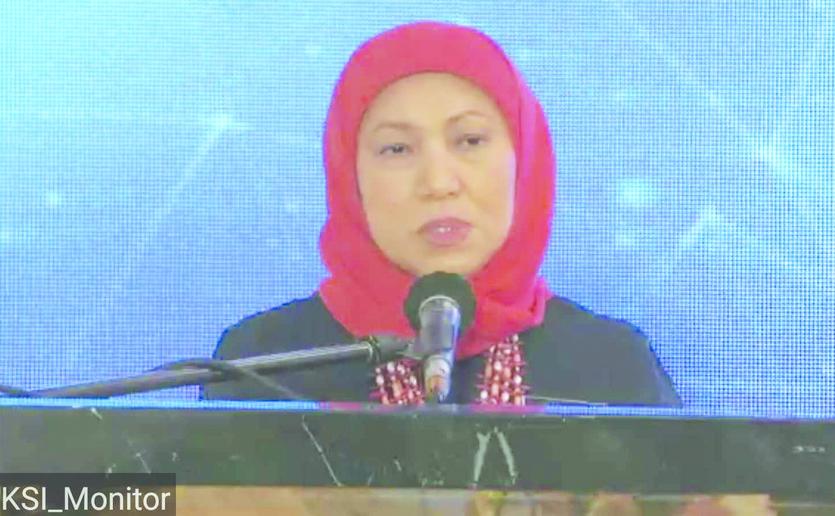 This photo shows Dato Sri Hajah Nancy Shukri, Malaysia's minister of Tourism, Arts and Culture at the 2020 Asia Economic and Entrepreneurship Summit on Sept 8. (PHOTO/CHINA DAILY)
This photo shows Dato Sri Hajah Nancy Shukri, Malaysia's minister of Tourism, Arts and Culture at the 2020 Asia Economic and Entrepreneurship Summit on Sept 8. (PHOTO/CHINA DAILY)
Malaysia is investing in technological development and innovation to help its micro, small and medium enterprises and businesses and operators in tourism, arts and culture sectors recover from the pandemic.
Datuk Seri Dr Wan Junaidi Tuanku Jaafar, Malaysia’s Minister of Entrepreneur Development and Cooperatives, said the Southeast Asian country is encouraging local businesses to embrace new technology and innovation in order to adapt to the ‘new normal’.
The one-day event, held in Kuala Lumpur, was jointly organized by the KSI Strategic Institute for Asia Pacific, the Pacific Basin Economic Council and China Daily
“We have to accept life will never be the same after COVID-19. It pushes us to improvise and innovate,” the minister said in his keynote speech delivered at the 2020 Asia Economic and Entrepreneurship Summit on Sept 8.
The one-day event, held in Kuala Lumpur, was jointly organized by the KSI Strategic Institute for Asia Pacific, the Pacific Basin Economic Council and China Daily.
READ MORE: Summit: Innovation, cooperation to drive Asia recovery
The minister cited the launching of the National Technology and Innovation Sandbox (NTIS), which is one of the ways for entrepreneurs to test new technology. He added that the government is also promoting technology entrepreneurship among Malaysian youth.
Malaysian Prime Minister Muhyiddin Yassin launched NTIS in August and offers a venue for researchers, innovators and entrepreneurs to test their products and services. NTIS extends grants to startups that aim to develop and commercialize new technologies such as Artificial Intelligence, robotics and drone technology.
The pandemic has shown that “innovative, inclusive and sustainable growth” can only be possible through partnership between the government and the private sector, said the minister.
Malaysian telecommunication company Green Packet’s partnership with China’s technology giant Tencent as one example of a private sector’s initiative to promote innovation. Green Packet announced in August that it partnered with Tencent to set up a joint Internet data center in Malaysia. The cloud computing infrastructure is expected to go live in 2021.
ALSO READ: Netflix tools up in SE Asia as streaming battle heats up
Moving forward, as Malaysia eases lockdown measures, adopting new technology is a way for local businesses to increase productivity and create wealth, he said.
In her luncheon speech at the summit, Dato Sri Hajah Nancy Shukri, minister of Tourism, Arts and Culture, pointed out that “innovation requires new concepts” and change now becomes a call of the era.
Malaysia aspires to be a world-class tourist and cultural destination and to build national identity with arts, culture and heritage.
As the first country to legalize e-hailing taxi business in 2017 with effective initiatives to push taxi labs and regulations, Malaysia has introduced robust incentives and plans to revitalize and fully recover the tourism industry by the second quarter of 2021, she said.
Usually tourism is the first to be stricken by the pandemic but the last to recover due to border control measures.
But Malaysia is aiming for sustainable tourism with incentives for homestays, hotels, resorts, tourism agencies, transport operators, recreation businesses and others in related sectors to provide local delights and true flavors, said the minister.
The businesses are moving for fulfilling customer satisfaction in a relaxed environment with safety and health protocols but fresh air.
Moreover hotels are offering favorable packages such as complementary third nights; digital operations have smoothened online booking and worked out E-craft bizarres which delighted tens of thousands of enthusiasts.
MSMEs have long been a backbone of Southeast Asia’s third biggest economy. MSMEs accounted for nearly 39 percent of Malaysia’s Gross Domestic Product and employed over 7 million people in 2019.
But these businesses were also among that suffered most during the pandemic, as lockdown and social distancing measures have disrupted the global supply chain, weakened consumer demand and reduced revenues.
A 10-billion ringgit stimulus package launched in April includes wage subsidy program, loan moratorium and tax deferment and eased cash flow for the MSMEs.
Malaysian GDP has been expanding annually by roughly five percent in the past few years. Tourism sector is among the start performers with 11 percent growth in 2019. But the pandemic halted this pace, with the GDP contracting by 17.1 percent in the second quarter.


